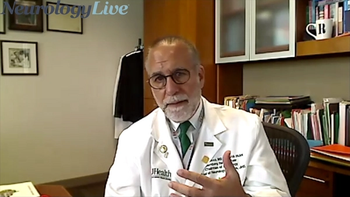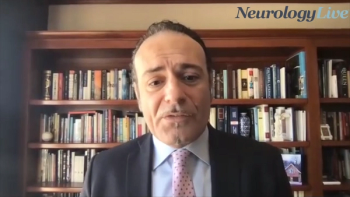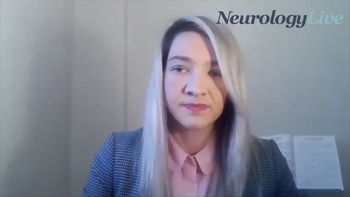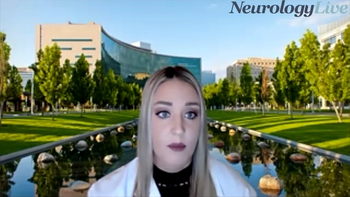
Neurology News Network for the week ending April 10, 2021.

Neurology News Network for the week ending April 10, 2021.

The director of the Institute for Health, Health Care Policy, and Aging Research at Rutgers University discussed the issues that remain with enrolling patients into real-world dementia trials and standardizing measures.

Take 5 minutes to catch up on NeurologyLive's highlights from the week ending April 9, 2021.

The duo from the National Institutes of Health discussed how monitoring and treating paramagnetic rim lesions can improve patient care in multiple sclerosis.

Antisense-mediated reduction of mutant FUS protein previously showed prevention of motor neuron loss in an FUS-ALS mouse model.

The chair of neurology and Olemberg Family Chair of Neurological Disorders at the University of Miami Miller School of Medicine detailed the reasons behind the lack of research on social determinants of health on stroke outcomes.

"Mind Moments," a podcast from NeurologyLive, brings you an exclusive interview with Bhooma Aravamuthan, MD, DPhil.

Yujie Wang, MD, a neurologist from the University of Washington Medical Center, discussed examining the 1-hour post monitoring period of natalizumab infusion amid the COVID-19 pandemic.

The Gary Sinise Foundation Avalon Network aims to combat TBI and post-traumatic stress in veterans and first responders.

The professor of neurology at Johns Hopkins University, and a member of the Curing Coma Campaign’s Scientific Steering Committee shared her insight into the current management of coma and the need for better prognostication.

Researchers studied associations between CSF neurofilament light, neurogranin, and t-tau with measures of cortical thickness, white matter hyperintensities, and microstructural integrity.

Annualized relapse rate reduction, fatigue, magnetic resonance imaging activity, brain volume loss, and no evidence of disease activity status were all superior in the ponesimod-treated group.

The consultant in the Department of Neurology at Mayo Clinic discussed the mounting number of unmet needs for patients with Parkinson disease.

A majority of patients across all 3 cohorts maintained or improved their motor function shown by changes from baseline in Revised Hammersmith Scale scores.

A case report showed 1 patient in the vaccine arm developed Guillain-Barré syndrome, though 1 in the placebo arm also developed the syndrome, implying coincidence rather than causation.

The senior director of patient management, care, and rehabilitation research at the National MS Society discussed the lack of studies on progressive MS compared to RRMS.

Researchers found significant differences between clinically relevant areas in participants with progressive MS, relapsing MS, and healthy controls.

Overall, 91% of participants in the pooled bimagrumab group and 89.1% in the placebo group had at least 1 or more treatment-emergent adverse event.

The chair of neurology and Olemberg Family Chair of Neurological Disorders at the University of Miami Miller School of Medicine provided plans of action to reduce racial and ethnic disparities in stroke.

The consultant in the department of neurology at Mayo Clinic detailed a number of topics surrounding Parkinson Disease Awareness Month, including the progress made in the last 2 decades.

Stephanie Blandford, MSc, a PhD candidate at Memorial University of Newfoundland, discussed some advantages of using IL-1RA over NfL in predicting disability in multiple sclerosis.

The PhD candidate at the Barts MS Center in London discussed the upcoming Chariot MS study as well as further research she would like to conduct in personalized cladribine dosing.

Researchers studied concentrations of recombinant tissue plasminogen activator locally and systemically in patients with IS.

Patients with a history of abuse reported a higher average or median questionnaire scores that focused on anxiety, depression, photophobia, hyperacusis, ictal allodynia, and interictal allodynia.

Alise Carlson, MD, a resident at Cleveland Clinic, provided insight on how raising awareness for genetic leukodystrophies may ultimately improve misdiagnosis rates.

Alzheimer disease-related neurodegeneration was correlated only with the thickness of the ganglion cell-inner plexiform layer.

The chief medical officer of Biohaven Pharmaceuticals discussed the recently initiated phase 2/3 clinical trial of zavegepant for the prevention of migraine.

Researchers found a 70% infarct resolution and 90% motor recovery in mice injected with the EFF-nanotransfected cells.

The director and founder of the Sleep Centers of Middle Tennessee discussed his team’s efforts to further patient understanding of obstructive sleep apnea.

There were no significant treatment group differences for measures of Alzheimer disease regional atrophy, cerebral blood flow, or mean fractional anisotropy.